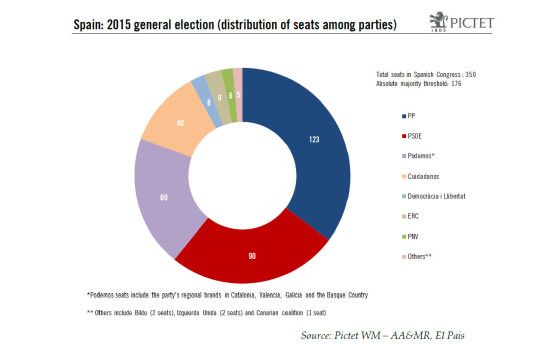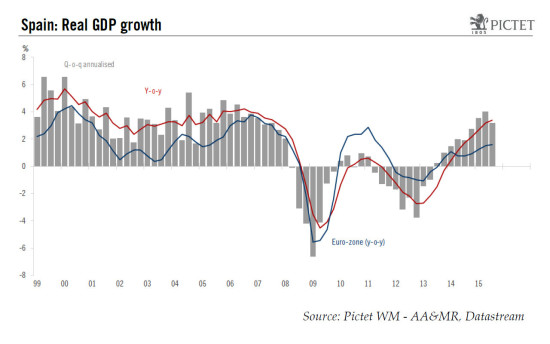The 2015 general elections marked one of the major changes in Spanish political history. For the first time since Spain embraced democracy in the late 1970s, the two parties that have dominated the political landscape (the Socialist Party, or PSOE, and the Popular Party, PP) have been challenged by two emerging groups: Ciudadanos (liberal-reformist) and Podemos (radical left). General elections held yesterday yielded a highly fragmented Congress with no absolute majority for a single party and no clear government coalition. This will make forming a new stable government difficult. Thus, new elections early next year (most probably in March) cannot be ruled out. General elections: a fragmented outcome By way of a reminder, in the previous general elections (November 2011), the centre-right PP led by Mariano Rajoy won the election with 44.6% of the votes and obtained an absolute majority with 186 seats. At that time, PSOE won a 28.8% share of the votes (110 seats). The two historical national parties polled 196 seats of the 350 available in the Congress. In contrast, yesterday’s general election produced a highly fragmented Congress, confirming the end of the PP-PSOE political duopoly at national level. The ruling conservative party (PP) won the election with a 28.7% share of votes.
Topics:
Nadia Gharbi considers the following as important: Macroview
This could be interesting, too:
Cesar Perez Ruiz writes Weekly View – Big Splits
Cesar Perez Ruiz writes Weekly View – Central Bank Halloween
Cesar Perez Ruiz writes Weekly View – Widening bottlenecks
Cesar Perez Ruiz writes Weekly View – Debt ceiling deadline postponed
The 2015 general elections marked one of the major changes in Spanish political history.
For the first time since Spain embraced democracy in the late 1970s, the two parties that have dominated the political landscape (the Socialist Party, or PSOE, and the Popular Party, PP) have been challenged by two emerging groups: Ciudadanos (liberal-reformist) and Podemos (radical left). General elections held yesterday yielded a highly fragmented Congress with no absolute majority for a single party and no clear government coalition. This will make forming a new stable government difficult. Thus, new elections early next year (most probably in March) cannot be ruled out.
General elections: a fragmented outcome
By way of a reminder, in the previous general elections (November 2011), the centre-right PP led by Mariano Rajoy won the election with 44.6% of the votes and obtained an absolute majority with 186 seats. At that time, PSOE won a 28.8% share of the votes (110 seats). The two historical national parties polled 196 seats of the 350 available in the Congress. In contrast, yesterday’s general election produced a highly fragmented Congress, confirming the end of the PP-PSOE political duopoly at national level.
The ruling conservative party (PP) won the election with a 28.7% share of votes. Nevertheless, it saw the number of its seats fall to 123, well below the 176 minimum required for an absolute majority. PSOE came in second with 90 seats (22.0%), its worst result ever.
The far-left party Podemos (20.6%) finished third with a total of 42 seats, or as many as 69 if we count the party’s regional brands in Catalonia, Valencia, Galicia and the Basque Country. The Ciudadanos party (13.9%) came in fourth with 40 seats. However, the party underperformed strongly compared with the pre-election opinion polls. Among smaller parties, Izquierda Unida won two seats.
As for regional parties, the Catalan Republican Left (ERC) managed to obtain nine seats, while Democracia i Llibertat, the new brand led by Catalan premier Artur Mas, secured eight seats. Meanwhile, the Basque Nationalist party (PNV) garnered six seats while the radical left party Bildu obtained two. The Canarian coalition (CC) won one seat (see chart below).
What’s next?
As a consequence of the highly fragmented Congress, it will take several weeks at best to form a new government. The procedure for appointing the prime minister is enshrined in Article 99 of the 1978 Constitution (see this article from El País for further details). In brief, the process will officially begin on 13 January, the day on which the Congress holds its inaugural meeting. After consulting with the party leaders in Congress, the King of Spain, Felipe VI, will propose a candidate to head the Spanish government (not necessarily the leader of the party that polled most votes). The candidate will need to win the confidence vote in Congress to become a PM.
The first confidence vote requires an absolute majority (at least 176 votes of the total of 350). If the candidate fails to win an absolute majority, a second vote has to take place within 48 hours but with a lower threshold (i.e. a simple majority will be sufficient). In the event of failure to secure that simple majority, the King can propose other candidates.
However, if no PM is elected within two months of the first confidence vote, parliament would be dissolved and new general elections would be called – as early as March 2016 in this case.
What are the possible alliances?
The PP still remains the main Spanish party. However, not only is the party a long way from achieving an absolute majority; it also recorded the worst result for a winning party since Spain embraced democracy in late 1970s (the previous record low was held by Aznar in 1996 with 156 seats). Mariano Rajoy will thus find it very difficult to govern.
What are the possibilities for him to remain in power?
A centre-right alliance (PP-Ciudadanos – combined seats: 163) as seen in May’s regional elections would not reach an absolute majority even with the support of regional parties PNV and CC. Thus, broadly speaking, Mariano Rajoy has two options to remain in power: a grand coalition (PP-PSOE – combined seats: 213) or a PP-minority government based on the abstention of both PSOE and Ciudadanos. The first option appears quite unlikely given the ideological differences between the two historical national parties. Meanwhile, the second option would result in a very fragile government. Moreover, according to recent statements made by Pedro Sanchez, (PSOE’s leader), a no vote is more likely than an abstention.
Is a Portuguese coalition style possible in Spain?
A PSOE-Podemos alliance (combined seats: 159) would fail to reach an absolute majority as well. They would therefore need the support of other smaller national (IU) and local left parties (Bildu). Nevertheless, although such an alliance appears numerically appealing, it will be quite difficult to manage owing to strong differences among those parties, including on the Catalan issue. On this point both Podemos and PSOE have different views: Podemos supports a referendum (not allowed by the constitution) whereas PSOE is in favour of a change in constitution to grant more autonomy to Catalonia. Moreover, both party leaders Pedro Sanchez (PSOE) and Pablo Iglesias (Podemos) will ask for the leadership of the New Leftist alliance.
Could we see a big coalition between PSOE, Ciudadanos and Podemos?
In theory, a Cuidadanos-PSOE-Podemos coalition would have a large majority in Congress. However, in practice, Albert River, the leader of the Ciudadanos party, has already ruled out this option as his party will never back a government that includes the Podemos party.
Overall, at this stage, no obvious solutions seem to be emerging from yesterday’s elections. Thus, new elections in March cannot be ruled out.
Political uncertainty, but low systemic risk
The economic and financial backdrop is much more supportive than before the crisis. The country has been growing for over the last two years now in the aftermath of its extended double-dip recession between 2008 and 2013 (see the chart below). The Spanish economy is likely to continue to materially outperform the euro area average next year, although it probably reached a cyclical high in y-o-y growth rate in Q3.
However, if political uncertainties remain entrenched, consumption and investment prospects might be dented, posing some risk to the recovery. Furthermore, this could create some financial stress. Meanwhile, the ECB has announced that it would pause its QE programme from 22 December until 1 January, with asset purchases resuming on 4 January. Poor liquidity conditions will not help either, and volatility may return to the Spanish bond market or even to the broader periphery. Beyond that, however, we suspect that supportive economic conditions in the region and a more favourable financial and institutional backdrop will prevent financial tensions from spiralling into a more severe, systemic-like episode of stress.


